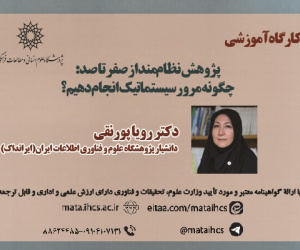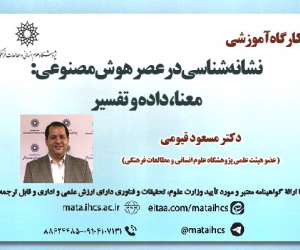Jewish Ethics: Deontological or Teleological? (مقاله علمی وزارت علوم)
درجه علمی: نشریه علمی (وزارت علوم)
منبع:
Journal of Interreligious Studies on the Qur'an and the Bible, Vol. 2, No. 1, Spring and Summer 2025
حوزههای تخصصی:
شماره صفحات:
۱۸۹ - ۲۲۶
دریافت مقاله
تعداد دانلود :
۶
آرشیو
چکیده
Every ethical system possesses at least six core elements: a theory of moral value, fundamental moral principles, rules of inference, incentives for adhering to ethical principles and rules, enforcement mechanisms for those principles and rules, and a justification for the necessity of being moral and for the validity of the said ethical system. This system is constructed and refined based on sources of moral knowledge and ethical foundations and is presented to its target society. Within this system, the theory of moral value is recognized as the principal element, upon which all other elements rely in some manner. Within Jewish ethical systems, two distinct theories are observed concerning the theory of moral value: "A deontological perspective and a teleological perspective. Some scholars currently argue that Jewish ethics is deontological and present reasoning for this position." This paper, with reference to the Tanakh (the Old Testament) and the foundations of ethics in Judaism, emphasizes the teleological viewpoint and critiques the arguments put forth by deontologists. The difference between these two perspectives has been notably evident in the conduct of the Zionist regime and its supporters over the past two years. From a deontological viewpoint, it is sufficient for a religious scholar to justify, based on their own interpretation, the massacre of the people of Gaza, Lebanon, Yemen, and Iran by citing a divine command; in this scenario, no rational, empirical or even emotional argument can prevent such crimes.اخلاق یهودی غایت گرا یا وظیفه گرا؟
هر نظام اخلاقی دست کم دارای شش عنصر اصلی است: نظریه ارزش اخلاقی، اصول بنادین اخلاقی، قواعد استنتاجی، مشوق های رعایت اصول و وقاعد اخلاقی، ضمانت های اجرای آن اصول و قواعد و نیز توجیه و بیان لزوم اخلاقی بودن و نیز درستی نظام اخلاقی مزبور. این نظام، با توجه به منابع معرفت اخلاقی و در نظر گرفتن مبانی اخلاق، ساخته و پرداخته شده و به جامعه هدف ارائه گردیده است. در این نظام، نظریه ارزش اخلاقی اصلی ترین عنصر شناخته می شود که سایر عناصر هرکدام به گونه ای به آن متکی هستند. در نظام اخلاق یهودی، درباب نظریه ارزش اخلاقی دو نظریه متفاوت دیده می شود: دیدگاه وظیفه گرا و دیدگاه غایت انگار. اکنون عده ای بر آن هستند که اخلاق یهودی، یک اخلاق وظیفه گراست و بر این مطلب استدلال می نمایند. در این نوشتار، با توجه به تنخ (عهد عتیق) و مبانی اخلاق در یهودیت، دیدگاه غایت انگار مورد تأکید قرار گرفت و ادله وظیفه گرایان مورد نقد و بررسی واقع شد. روشن است که تفاوت این دو دیدگاه، در رفتار رژیم صهیونی و نیز صهیونیست ها در دو سال اخیر کاملا مشهود است. در نگاه وظیفه گرایانه، کافی است یک عالم دینی با برداشت خود، قتل عام مردم غزه، لبنان، یمن و ایران را مستند به فرمان الهی کند؛ در این حالت دیگر هیچ دلیل عقلی و یا تجربی و حتی عاطفی نمی تواند مانع این جنایت شود.







